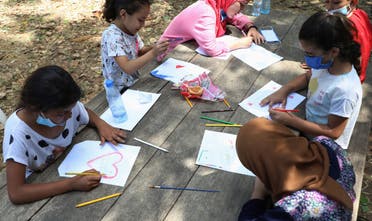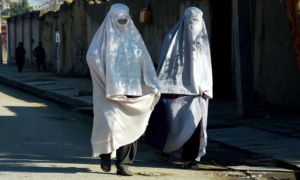Soaring prices and widespread unemployment brought on by the pandemic and the severe economic crisis in Lebanon have plunged thousands of families into “multidimensional poverty,” with around 84 percent of households not being able to cover necessities, UNICEF reported on Thursday.
“Children are feeling let down and losing trust in their parents for being unable to meet their basic needs, which in turn increases tensions in the household,” UNICEF said in a statement.
For the latest headlines, follow our Google News channel online or via the app.
“As children are increasingly sent out to work in Lebanon, and adults become unemployed, the traditional parent-child relationship is being destroyed.”
UNICEF’s study on child poverty and a child-focused rapid assessment (CFRA) found that children were aware of the impact the crisis has had on their lives and on the country, with many no longer dreaming of a better future and believing that emigration is their only hope.

The crisis has also taken a toll on children’s mental health, which is particularly concerning as they are also unable to receive the care they need.
“The crisis is affecting every aspect of children’s lives. Children are growing up without enough food, without proper access to healthcare, and, in some cases, working to support their families,” UNICEF Representative in Lebanon Edouard Beigbeder said in a statement.
“Critical reforms are needed to safeguard children’s future. The Government should implement urgent social protection measures, ensure access to quality education for every child and strengthen primary health care and child protection services.”
UNICEF found that 38 percent of households reduced spendinf on education (compared to 26 percent in 2021), 60 percent cut spending on health treatments (up from 42 percent in April 2021), 70 percent of households have to borrow money for food or buy food on credit, and 36 percent of caregivers felt less tolerant with their children and treated them more harshly.
Rising tensions, which is further fueled by significant polarization within communities, have led to an increase in violence, including in households and schools, meaning that many streets and neighborhoods and no longer safe. This also further limits children, especially girls who are restricted from leaving their homes for fear of being harassed.
“Multidimensional child poverty requires a multidimensional response grounded in a major strengthening of Lebanon’s social protection system that will ensure the fundamental rights of vulnerable children are protected,” Beigbeder added.
Middle East Lebanon is the world’s angriest country, followed by Turkey, Armenia: Data
“This means increasing access to social services, scaling up social assistance and providing social grants for the most vulnerable families.”
The UNICEF report comes against a backdrop of increased suicides and murders in the Levant country.
Lebanon has seen an 18 percent increase in murders and almost an 8 percent surge in suicides in 2022 so far, compared to the same period last year, according to new data published by Beirut-based research center Information International.
Dramatic surges in crime and theft were recorded in Lebanon last year, mostly due to the economic crisis.
Information International also reported a 212 percent increase in car thefts, a 266 percent increase in theft crimes overall and a 101 percent increase in murders compared to the first 10 months of 2019, right before the economic crisis took a turn for the worse.
Lebanon was also rated the angriest country in the world by US company Gallup in June this year. The firm’s Global Emotions Report analused emotions in over 100 countries and found that nearly half of the survey respondents in Lebanon experienced anger regularly, including on the day before they took part in the survey.
The Levant country also ranked among the saddest and most stressed countries in the Gallup report.




